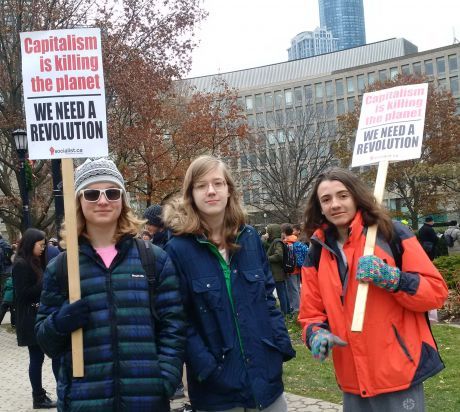News
You are here
Climate Justice Marches November 29th A Great Success

December 1, 2019
Fridays for the Future called for actions against climate change on November 29th and young people in over 100 cities and towns across the country responded and over one million joined world wide. One of the largest actions occurred in Madrid where the COP 25 United Nations conference on the climate is taking place.
In Toronto, protesters gathered at the provincial legislature on a very cold day. Students were streaming from the subways having walked out of their schools, colleges and universities. The organizers decided to have only three speakers address the thousands assembled: Sarain Fox, also known as Morning Star Woman, an Anishinaabekwe Ojibwa artist spoke of the leadership role being taken by Indigenous peoples in this movement, Abonti Nur Ahmed, a seventeen year old climate justice activist, who has been working to bring marginalized communities to the fore front of the struggle, and Rebecca Keetch a member of Unifor Local 222 at General Motors Oshawa from the Green Jobs Oshawa coalition which is working to nationalize the facility, retool it to produce electrified vehicles, and keep thousands of unionized jobs. They represented three key constituencies which are critical to the long term success of climate justice movement.
The march lead by Indigenous people headed out of Queens Park to King and Bay which is the heart of the financial district. The intent was to target the corporations and the banks that continue the resource extraction which puts profit before people and the planet. A specific action took place at RBC, the Royal Bank of Canada.
Along the way the marchers were joined by delegates from the Ontario Federation of Labour (OFL) Convention which brought the broader trade union movement to the event. A Fridays for Future member addressed the convention. In the build up to the march the Toronto and York Region Labour Council held a meeting of labour activists in the city with speakers from the Coalition of Black Trade Unionists, climate groups and youth activists asking them to mobilize with fellow workers.
It also called a well attended climate justice caucus at the OFL convention with discussion among public sector, industrial and building trade workers on how to implement an inclusive just transition program so that no worker is left behind. There was consensus that we need to build a rank and file workers network to broaden the involvement of labour in the climate justice movement.
Everything we do has an impact on what happens next. The demands that were developed for the Sept 27th climate strike in Toronto which include Indigenous rights and sovereignty, defending land, water and life, no worker left behind, justice for migrants and refugees, universal public services and infrastructure shaped the organizing for this march as well. Many of the youth who came out calling for ‘System Change Not Climate Change’ have a growing understanding that the system is rotten to the core and are seeing capitalism as the problem.
This campaign is continuing to grow and to broaden. The fact that Fridays for Future called the November 29th marches, using the momentum of the September 27th global climate strike, drew more and more young people into the organizing, rubbing shoulders with socialists and other like minded activists from different communities and sectors. This deepens the commitment to continue to build the climate justice movement and bodes well for the future.
Section:
Topics:










